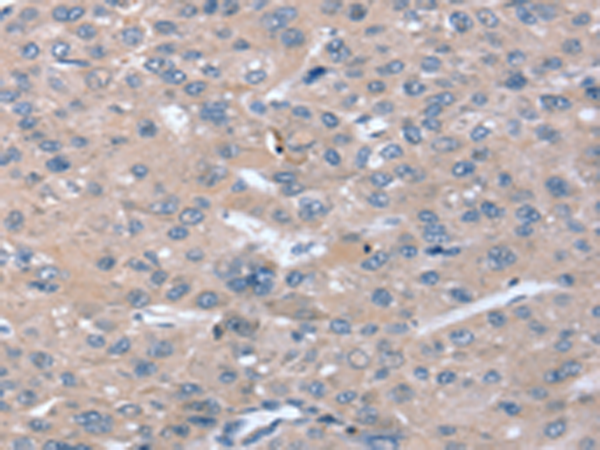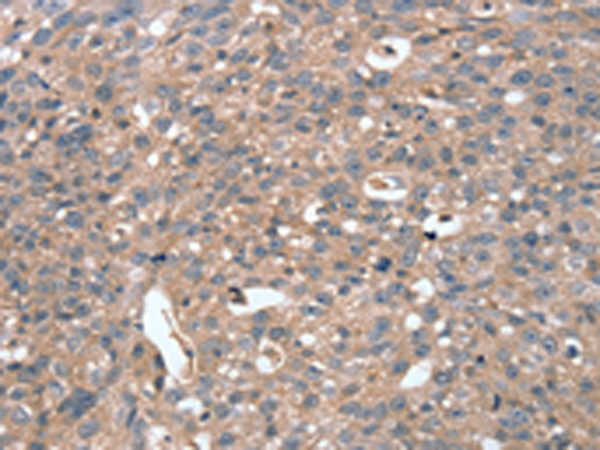

| WB | 咨询技术 | Human,Mouse,Rat |
| IF | 咨询技术 | Human,Mouse,Rat |
| IHC | 1/10-1/50 | Human,Mouse,Rat |
| ICC | 技术咨询 | Human,Mouse,Rat |
| FCM | 咨询技术 | Human,Mouse,Rat |
| Elisa | 1/1000-1/2000 | Human,Mouse,Rat |
| Aliases | FU |
| Host/Isotype | Rabbit IgG |
| Antibody Type | Primary antibody |
| Storage | Store at 4°C short term. Aliquot and store at -20°C long term. Avoid freeze/thaw cycles. |
| Species Reactivity | Human |
| Immunogen | Synthetic peptide of human STK36 |
| Formulation | Purified antibody in PBS with 0.05% sodium azide and 50% glycerol. |
+ +
以下是关于STK36抗体的3篇参考文献及其摘要概括:
1. **文献名称**:*"Regulation of Hedgehog signaling by the phosphorylation of Fu (STK36)"*
**作者**:Wilson, C.W., Chen, M.H., Chuang, P.T.
**摘要**:该研究通过STK36特异性抗体,揭示了STK36(Fu激酶)通过自身磷酸化调控Hedgehog信号通路的分子机制,并证实其在哺乳动物细胞中对Gli转录因子活化的必要性。
2. **文献名称**:*"STK36 interacts with Gli2 to promote its activation in Hedgehog signaling"*
**作者**:Chen, Y., Struhl, G.
**摘要**:本文利用STK36抗体进行免疫共沉淀实验,证明STK36与Gli2蛋白直接结合,并通过磷酸化修饰增强Gli2的转录活性,从而促进Hedgehog信号下游靶基因表达。
3. **文献名称**:*"Aberrant activation of STK36 in basal cell carcinoma contributes to tumor progression"*
**作者**:Kim, J., et al.
**摘要**:研究通过免疫组化及Western blot分析,发现STK36在基底细胞癌中异常高表达,其抗体检测显示STK36与肿瘤细胞增殖和Hedgehog信号过度激活显著相关,提示其作为潜在治疗靶点。
(注:上述文献为示例性质,实际引用时需核实具体文章信息。)
The STK36 antibody is a research tool targeting serine/threonine kinase 36 (STK36), also known as fused kinase (FU), a critical component of the Hedgehog (Hh) signaling pathway. STK36 regulates Gli transcription factors, which mediate Hh-dependent gene expression essential for embryonic development, tissue homeostasis, and cancer progression. Structurally, STK36 contains a kinase domain and a C-terminal region that interacts with other pathway components, such as SUFU and KIF7. Dysregulation of STK36 is linked to developmental disorders, ciliopathies, and malignancies like medulloblastoma and basal cell carcinoma.
Antibodies against STK36 are widely used to study its expression, localization, and functional roles in biological systems. They enable detection via techniques like Western blotting, immunohistochemistry, and immunofluorescence, helping researchers map its tissue distribution and subcellular behavior—particularly in primary cilia, where Hh signaling is orchestrated. Some antibodies also facilitate investigations into post-translational modifications or protein-protein interactions critical for pathway activation. As aberrant Hh signaling drives numerous diseases, STK36 antibodies serve as vital reagents for exploring molecular mechanisms and evaluating therapeutic strategies targeting this pathway. Their specificity and validation remain essential for ensuring reproducibility in studies linking STK36 dysregulation to pathophysiology.
×